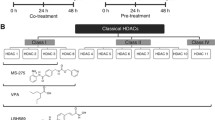Abstract
We investigated the effect of the histone deacetylase inhibitors (HDIs), trichostatin A and trapoxin A on leukemia cells and cell lines from the viewpoint of differentiation induction. TSA induced differentiation in erythroid cell lines by itself, whereas it synergistically enhanced the differentiation that was directed by all-trans retinoic acid (ATRA) or vitamin D3 in U937, HL60 and NB4 cells. The combined treatment of HDI with ATRA induced differentiation in ATRA-resistant HL60 and NB4 cells. The transcriptional expression during the treatment with HDI was examined in HL60, U937 and MEG-O1. Cell cycle-regulator genes (p21waf1 and p16INK4A) were upregulated or constantly expressed, erythroid-specific genes (GATA-1, β-globin) were silent or downregulated, and housekeeping genes (β-actin and GAPDH) were constantly expressed. Twelve of 35 (34%) clinical samples from AML patients ranging from M0 to M7 also displayed both phenotypical and morphological changes by the treatment with TSA alone. HDIs are thus the potent inducer or enhancer of differentiation in acute myeloid leukemia and regulate transcription in an ordered manner.
Similar content being viewed by others
Author information
Authors and Affiliations
Rights and permissions
About this article
Cite this article
Kosugi, H., Towatari, M., Hatano, S. et al. Histone deacetylase inhibitors are the potent inducer/enhancer of differentiation in acute myeloid leukemia: a new approach to anti-leukemia therapy. Leukemia 13, 1316–1324 (1999). https://doi.org/10.1038/sj.leu.2401508
Received:
Accepted:
Published:
Issue Date:
DOI: https://doi.org/10.1038/sj.leu.2401508
- Springer Nature Limited
Keywords
This article is cited by
-
The evolving landscape in the therapy of acute myeloid leukemia
Protein & Cell (2013)
-
Mechanisms of action and resistance to all-trans retinoic acid (ATRA) and arsenic trioxide (As2O3) in acute promyelocytic leukemia
International Journal of Hematology (2013)
-
CpG methylation patterns and decitabine treatment response in acute myeloid leukemia cells and normal hematopoietic precursors
Leukemia (2012)
-
Phase II study of the histone deacetylase inhibitor belinostat (PXD101) for the treatment of myelodysplastic syndrome (MDS)
Annals of Hematology (2012)
-
p53 Independent epigenetic-differentiation treatment in xenotransplant models of acute myeloid leukemia
Leukemia (2011)




